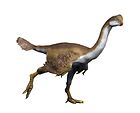Luoyanggia
| Luoyanggia Temporal range: Early Cretaceous,
| |
|---|---|
| Scientific classification | |
| Kingdom: | Animalia |
| Phylum: | Chordata |
| Clade: | Dinosauria |
| Clade: | Saurischia |
| Clade: | Theropoda |
| Family: | †Oviraptoridae |
| Genus: | †Luoyanggia Lü et al., 2009 |
| Species: | †L. liudianensis
|
| Binomial name | |
| †Luoyanggia liudianensis Lü et al., 2009
| |
Luoyanggia (meaning "from Luoyang") is a genus of oviraptorid dinosaur known from the Early Cretaceous Haoling Formation of the in Henan Province, central China. The type species is L. liudianensis.[1] Holtz estimated it at 1.5 meters (5 ft) and around 2.27-9.1 kg (5-20 lbs).[2] Molina-Pérez and Larramendi gave a similar size of 1.2 meters (4 ft) and 8.5 kg (18.7 lbs).[3]
Paleobiology[]
Non-avian dinosaurs that co-existed with Luoyanggia included Ruyangosaurus, Zhongyuansaurus, Yunmenglong, Xianshanosaurus, and "Huanghetitan" ruyangensis. The type horizon of Luoyanggia was initially thought to date Cenomanian stage of the late Cretaceous period, but extensive fieldwork in the Ruyang Basin and invertebrate and microfossil assemblages indicate an Aptian-Albian age for the Haoling Formation.[4]
See also[]
- Timeline of oviraptorosaur research
References[]
- ^ Lü., J., Xu, L., Jiang, X., Jia, S., Li, M., Yuan, C., Zhang, X. and Ji, Q. (2009). "A preliminary report on the new dinosaurian fauna from the Cretaceous of the Ruyang Basin, Henan Province of central China." Journal of the Palaeontological Society of Korea, 25: 43-56.
- ^ Holtz, Thomas R., Jr.; Rey, Luis V. (2007). Dinosaurs: The Most Complete, Up-to-Date Encyclopedia for Dinosaur Lovers of All Ages ([1]). New York: Random House. ISBN 978-0-375-82419-7.
- ^ Molina-Pérez & Larramendi (2016). Récords y curiosidades de los dinosaurios Terópodos y otros dinosauromorfos. Spain: Larousse. p. 271.
- ^ Xu, L., Pan, Z.C., Wang, Z.H., Zhang, X.L., Jia, S.H., Lü, J.C., Jiang, B.L., 2012. Discovery and significance of the Cretaceous system in Ruyang Basin, Henan Province. Geological Review 58, 601-613.
- Early Cretaceous dinosaurs of Asia
- Oviraptorosaurs
- Fossil taxa described in 2009
- Theropod stubs















